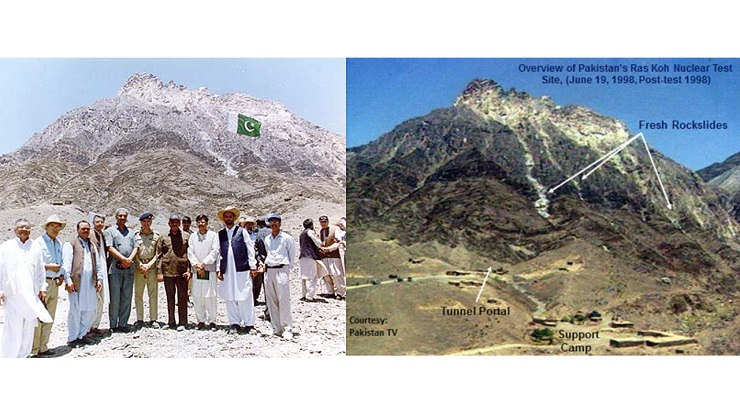Baloch activists in Germany have launched a protest against Pakistan, accusing it of perpetrating deadly nuclear radiation illnesses following the 1998 atomic tests in the bone dry Chagai district of Balochistan. The protests held in front of the Brandenburg Gate in Potsdam, were timed with Pakistan's May 28 tests held over two decades ago.
The Free Balochistan Movement (FBM) has been organising the anti-nuke protests for the past many years in Europe. It has opposed the testing and stockpiling of nuclear weapons by the Pakistani establishment at various locations in Balochistan.
The protestors carried banners saying: "Pakistan's nuclear weapons are a threat to world peace".

In a statement to the media, the FBM alleged that "one of Pakistan’s numerous war crimes in Pakistan is the testing of its nuclear weapons in Balochistan. On May 28, 1998, the state of Pakistan selected the Baloch territory for its nuclear weapons test against the will of the Baloch nation."
Speaking with India Narrative, Jamal Nasir Baloch, the head of Foreign Affairs Department of FBM, said: "Pakistan polluted our environment with nuclear radiation and destroyed the natural habitat. Local people were displaced and dislocated while thousands of people were directly affected. The radiation levels after 1998 blasts brought new types of diseases which were uncommon earlier, such as different type of cancers and disabilities in newborns."
Between May 28 and May 30, 1998, Pakistan had conducted nuclear blasts in response to India's tests conducted two weeks earlier. Though Pakistan says that it had conducted six tests, several sources, including American and Indian, believe that the number may be just three.
Pakistan chose the huge, neglected and sparsely-populated region of Balochistan for the tests. The precise location was the Ras Koh hills in Chagai district. Though it is celebrated as a "Day of Greatness" by the Pakistanis, for the Baloch people it is remembered as a black day.
TBP Video: 28th May – Jubilations in Pakistan but Black Day in Balochistan? pic.twitter.com/7ZII2LMhFK
— The Balochistan Post – English (@TBPEnglish) May 28, 2021
In an article written by Shah Meer Baloch, former Visiting Fellow at the Institute for Peace Research and Security Policy at the University of Hamburg, for The Diplomat, he says that decades after the tests, the new generation is suffering from contamination-related diseases.
He quotes researcher Abdul Raziq: "… the impacts of the residual radiation resulting from the blasts, which has lingered over Chagai–cases of lung, liver, and blood cancer, skin diseases, typhoid, and infectious hepatitis, as well as serious effects on the nervous system, blood pressure, eyes, and throats, and on newborn babies."
Raziq's thesis, titled 'Impacts of Nuclear Tests on Chagai,' says that a significant number of people now suffer from thalassemia and hepatitis. There have been increased numbers of mental illness cases as the people find themselves hopeless against the various diseases caused by the aftermaths of the explosions.
The other ailments that have taken over the people of the region include cancer and thalassemia major. Raziq says that every third death after the nuclear tests in the region can be attributed to cancer. Baloch says that cancer is found in three districts of Balochistan – Chagai, Nushki, and Kharan, all of which are close to the Ras Koh mountains.
ATOMIC TESTS IN #BALUCHISTAN:
ANNIVERSARY OF AN #INFAMY#NoToPakistaniNukes pic.twitter.com/bW1ATbFVMa— Faiz M Baluch
(@FaizMBaluch) May 28, 2021
The irony about Balochistan and the Pakistan nuclear blasts is that the country is taking out the vast mineral resources from Balochistan while keeping its people poor and deprived. The Baloch nationalists have over the years highlighted that with China increasing its investments in Pakistan, the marginalisation of the Baloch people has now doubled.
The head of foreign affairs of FBM adds: "We believe that Pakistan's nukes are not just a threat to the Baloch nation but to the entire humanity. Just two weeks ago – on 17th May 2021, Pakistan's National Assembly debated the Palestine-Israel conflict, where Mufti Abdul Shakoor, an MP proposed that Israel should be destroyed by Pakistani nuclear weapons".
Of the various sites that Pakistan uses to store its nuclear stockpile, it seems to have one in Balochistan as well. This also is opposed by the Baloch activists as they want Balochistan—a marginalised and outcast region by the Pakistani establishment—to be devoid of any nuclear stockpile.
Media reports say that the radiation in the area has impacted children in the form of genetic problems such as facial deformities, eye problems, skin diseases, and limb dysfunction. The current generation is suffering from genetic abnormalities.
The Pakistani establishment has vehemently denied that any contamination has taken place in the region.
Undeterred, the Baloch activists have carried on with their #NoToPakistaniNukes campaign. They have urged global powers to take up the cause by raising human rights violations of the Baloch people as well as the issue of nuclear weapons in the hands of Pakistan.



















